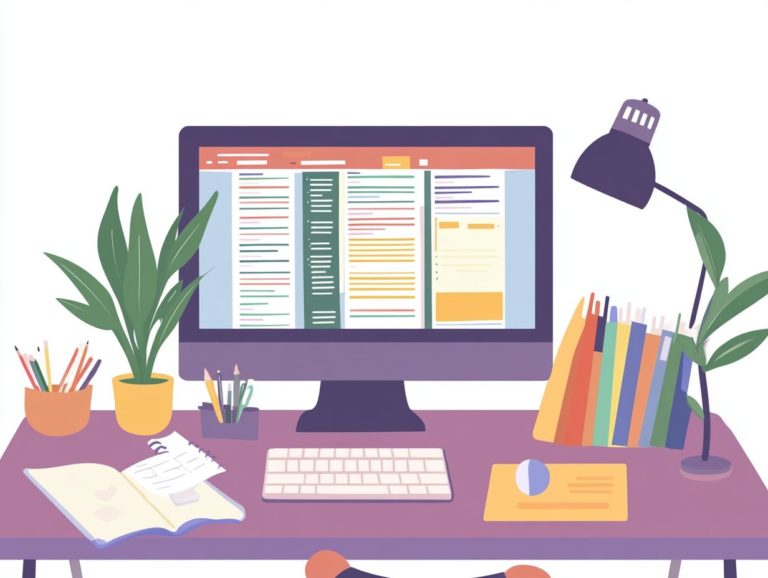the best time to start test preparation
Effective test preparation is essential for achieving success in any assessment.
Recognizing the significance of preparation empowers you to craft a personalized study plan that aligns with your schedule and study habits.
This guide will help you select the optimal start time for your preparation, develop a structured study plan, incorporate best practices to elevate your learning, and avoid common pitfalls that could hinder your progress.
Get ready to unlock your full potential and navigate the path to success with unwavering confidence!
Contents
- Key Takeaways:
- Understanding the Importance of Test Preparation
- Factors to Consider when Choosing a Start Time
- Creating a Study Plan
- Best Practices for Test Preparation
- Effective Study Techniques
- Managing Stress and Avoiding Burnout
- Common Mistakes to Avoid
- Procrastination and Last-Minute Studying
- Not Taking Breaks
- Frequently Asked Questions
Key Takeaways:

- Starting test preparation early increases your chances of success by allowing enough time to cover all material and practice effectively.
- Consider your personal schedule and test date when choosing a start time.
- A well-planned study schedule leads to better time management and reduces stress.
- Create a study plan with specific goals, break down material, and use effective study techniques to maximize productivity and avoid burnout.
- Avoid common mistakes like procrastination and neglecting breaks.
Understanding the Importance of Test Preparation
Test preparation, whether for the SAT or ACT, plays a pivotal role in your academic journey as you approach college admissions.
With these tests becoming increasingly significant in applications, effective prep can markedly elevate your performance, equipping you with tools to manage stress and reach your target scores.
Starting early allows you to build the knowledge and skills necessary to tackle the challenges of these assessments while balancing your high school commitments and extracurricular activities.
Why Preparation is Key to Success
Preparation is crucial for your success on the SAT and ACT as it equips you with essential test-taking strategies to help you achieve your target scores.
When you engage in well-structured study strategies, you become familiar with the test format and build your confidence. This newfound confidence significantly alleviates test anxiety, enabling you to approach your exams with a calm and focused mindset.
Incorporating practice tests into your preparation routine enhances your ability to manage time effectively and identify areas for improvement that might otherwise go unnoticed.
By setting realistic test goals, you can chart a steady course for progress, ensuring that your efforts translate into tangible outcomes.
Together, these elements cultivate a more confident and capable test-taker in you.
Factors to Consider when Choosing a Start Time
Selecting the optimal start time for your test preparation is vital, especially during your challenging junior year. To help you determine when you should start preparing for a standardized test, this decision can significantly shape your study habits and overall performance on crucial exams like the SAT and ACT.
Consider factors such as your personal schedule, school commitments, and the approaching test dates. Knowing your application deadlines can help you refine your study timetable, enabling you to maximize your test prep resources effectively.
By adopting a timely strategy, you can alleviate stress and boost your readiness for the tests ahead.
Personal Schedule and Study Habits
Effective time management and positive study habits are crucial as you prepare for the SAT and ACT, helping you navigate through your academic priorities.
By assessing your personal schedule, you can identify prime study blocks, ensuring you allocate enough time to review essential concepts and practice test strategies.
Account for your commitments, including extracurricular activities, as these significantly influence your overall preparation. Balancing your study time with sports, clubs, or part-time jobs enhances your high school experience and cultivates vital life skills.
Prioritize focused study sessions, setting specific goals for each block while also carving out time for relaxation and self-care. This creates a well-rounded approach to your exam readiness.
Test Date and Application Deadlines

Understanding test dates and application deadlines is crucial for your SAT and ACT prep. Aligning your study schedule with these dates ensures you’re ready on test day.
Using the right prep resources, like online tools and practice exams, boosts your confidence. A well-structured study plan with regular reviews helps you avoid last-minute panic.
Keep an eye on application deadlines to reduce stress. This practice enhances your performance when it matters most.
Creating a Study Plan
A structured study plan is key to succeeding in SAT and ACT prep. It helps you manage your time and resources effectively.
A good study schedule includes practice tests and focuses on your weak areas. This approach improves retention and builds confidence as the test date approaches.
This system helps you set clear goals and prepares you for the challenges of standardized testing. It also reduces test anxiety by providing a clear path to your target scores.
Breaking Down the Material
Breaking down your study material into smaller segments is essential. This method lets you focus on important subjects for better retention.
Use targeted strategies to tackle difficult math problems and improve reading skills. Organizing your study time for specific topics lets you dive deep into challenging areas.
Tools like flashcards and practice tests reinforce your learning. Group study sessions also promote collaborative learning.
Regular reviews throughout your prep help you retain information, making your academic journey more manageable.
Setting Realistic Goals
Setting achievable goals is vital for effective SAT and ACT prep. This gives you focus and motivation to reach your scores.
Identify specific, measurable objectives to create a personalized study plan. Establish a timeline to break your studies into smaller parts, reducing anxiety.
Setting short-term milestones tracks your progress and boosts your confidence with small victories. Techniques like self-reflection can enhance your commitment to the process.
Best Practices for Test Preparation
Employing best practices for test prep is crucial for excelling in the SAT and ACT. These methods include effective study techniques and stress management strategies that improve your performance.
Embrace these strategies, and you’re on your way to success on test day!
Effective Study Techniques

Effective study techniques are essential for students preparing for the SAT and ACT. These techniques help improve both thinking skills and content retention.
Incorporating methods like spaced repetition, which means reviewing material over time instead of cramming, can significantly elevate your memory retention. Active recall is another powerful strategy that encourages you to actively retrieve information, reinforcing your understanding in the process.
Engaging in collaborative learning creates a dynamic environment where you and your peers can share insights and tackle challenges together. This makes your study sessions not just effective but also enjoyable.
By harnessing these strategies, you can cultivate a deeper grasp of academic concepts, ultimately leading to improved performance on standardized tests. These techniques are crucial for fostering a growth mindset and promoting lifelong learning habits.
Managing Stress and Avoiding Burnout
Managing stress and avoiding burnout are vital for you as you prepare for the SAT and ACT. High levels of test anxiety can negatively impact your performance, especially when juggling rigorous study schedules alongside the pressure to achieve impressive scores.
You can adopt several stress management strategies, such as incorporating mindfulness practices into your daily routine. Simple techniques like focused breathing or meditation can significantly enhance your concentration and reduce anxiety.
Remember to take regular breaks during your study sessions. They not only refresh your mind but also help sustain your motivation, keeping your study efforts productive and balanced.
By structuring your study time with breaks and prioritizing self-care, you ll be able to boost your confidence and maintain peak performance during those crucial exam periods.
Common Mistakes to Avoid
Avoiding common mistakes during your SAT and ACT preparation is crucial for maximizing your performance and achieving your desired scores.
- Procrastination
- Cramming
Pitfalls like these can result in insufficient preparation and increased stress, ultimately undermining your efforts. By steering clear of these traps, you’re setting yourself up for success and ensuring a more effective study experience.
Procrastination and Last-Minute Studying
Procrastination and cramming are habits you should steer clear of, as they can seriously undermine your test preparation for the SAT and ACT. These pitfalls often lead to lower scores and an uptick in test anxiety.
When you rely on these last-minute strategies, you miss out on absorbing critical concepts and retaining information effectively. Instead of developing a deep understanding of the material, cramming results in superficial learning and increased stress.
Consistent preparation is key. It allows you to gradually familiarize yourself with the content, enhances your memory retention, and ultimately builds your confidence. By adopting a structured study plan, you can lighten the pressure and enable yourself to reach your academic goals.
Not Taking Breaks
Failing to take regular breaks during your SAT and ACT preparation can significantly diminish your focus and elevate stress levels. This should raise a red flag because effective study strategies truly emphasize the importance of balance and self-care.
When you dive headfirst into marathon study sessions without carving out time for rest, you might notice your cognitive performance slipping. Short breaks are essential for refreshing your mind and enriching your overall learning experience.
Consider employing techniques like the Pomodoro Technique, which encourages focused study intervals followed by brief rests. This method can help alleviate stress while promoting better retention of information, ultimately enhancing your academic performance.
Frequently Asked Questions

Start your journey to success today!
When is the best time to start test preparation?
The best time to start preparing for a test is as soon as you know you’ll be taking one. To maximize your study efforts, it’s helpful to consider what time of year is best for test preparation, which could be weeks or even months ahead.
Should I wait until the last minute to start studying?
No! Waiting until the last minute can lead to stress and overwhelm. It’s better to start early and feel confident.
What are the advantages of starting test preparation early?
Starting early means you have more time to review and practice. This builds your confidence and keeps stress away.
Is it ever too early to start preparing for a test?
It’s never too early! Gaining knowledge over time will help you feel ready when the test day arrives, and understanding the benefits of starting test prep early can make a big difference.
What if I have a busy schedule?
Even with a busy schedule, you can find time to prepare. Just a few minutes each day can make a significant difference.
Can I start preparing too late?
It’s better to start late than not at all. Even if you have limited time left, reviewing material and practicing is still valuable.





